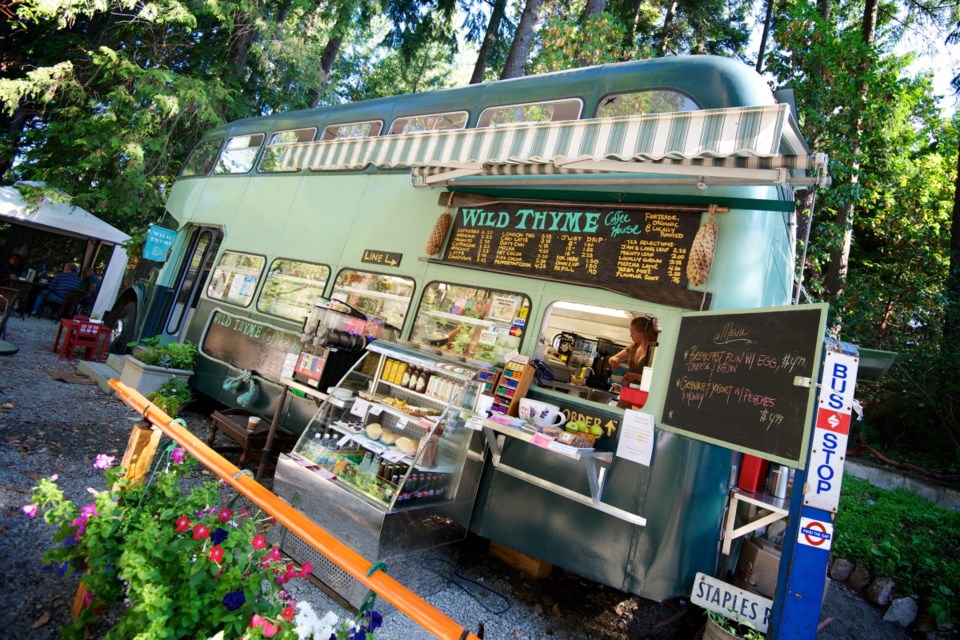 SATURNA ISLAND
SATURNA ISLAND
Its official name is the Wild Thyme Coffee House, but on Saturna they just call it the Bus, because that’s what it is.
Built in 1963, the old British double-decker tootled around Southend-on-Sea before being shipped over for Edmonton’s Commonwealth Games in 1978.
By the time Aleah Johnson found it in 2012, it had been decaying in a Surrey tow yard for at least six years. “All the windows were smashed out.”
But Johnson, then 27, had a vision. She dragged the relic onto a ferry (on the hook of a tow truck, it squeezed onto the Mayne Queen with just two inches of clearance) and up to her Saturna Island property. “I didn’t tell my boyfriend I was bringing a bus home.”
Then came 5 1/2 months of grunt work until, two years ago this month, the bus was reborn as a coffee shop down by the Lyall Harbour ferry terminal. Kitchen downstairs, a dozen tables upstairs, 20 seats outside.
Johnson stumbles out of bed at 4:45 a.m., has the doors open by 5:45 (8 on weekends). She employs five others, but still puts in an 80-hour week herself.
Don’t get the impression that this was all her work, though. Far from it. “This is the bus a community built” reads the sign by the window where you place your order.
On an island of just 300 people, Johnson had 217 names on the petition supporting the rezoning she needed. Thirty volunteers showed up to sand, prime and paint the bus. Ditto for the installation of the windows. Think of an old-fashioned barn-raising as in the movie Witness, only without the orchestral music and Amish farmers.
Many Saturna residents are rooting for Johnson, in a vaguely parental way, not just because of the gumption she has shown, but because of what she represents: a rare young person putting faith in the future. Hers was the first new commercial venture on the island in 15 years.
Saturna is largely peopled with grey-hairs. When Johnson began working on her coffee shop, she was one of only nine island residents between the ages of 20 and 30. The school remains open only because enrolment is bolstered by off-island kids who come over for environmental studies.
Not long ago, it had a pretty vibrant tourism-based economy, but that has dried up — not coincidentally, locals say, in the decade since the provincial government began shifting B.C. Ferries to a user-pay model. The tourism season that used to go from May 1 through Thanksgiving has diminished, limited now to July and August. With fares having almost doubled in a decade, children don’t come from Victoria as often to visit their parents. Ferry traffic between Tsawwassen and the Southern Gulf Islands fell more than 13 per cent between 2003-04 and 2013-14.
That last stat comes from a just-released Union of B.C. Municipalities study that concludes that by driving ferry fares up, the provincial government has been killing ridership, pushing B.C. Ferries revenue down — the exact opposite of what the user-pay shift was meant to do. (That echoes the 2012 findings of ferries commissioner Gord Macatee: “Fares have reached the tipping point, imposing a hardship on coastal communities and passengers, and ridership has declined as a result.”)
And no, the study says, you can’t just blame the economy. While ferry ridership has slipped, travel by other forms of transportation has risen in B.C.
Of greater concern than the effect on the corporation’s bottom line is the effect on the broader economy: The report claims $2.3 billion in lost activity.
In essence, the study says the Liberals’ current strategy is hurting B.C. Ferries at the fare box and driving the coastal economy off a cliff. Delegates to this month’s UBCM conference will be asked to urge the province to stop increasing fares.
“We’re definitely one of the coastal communities that’s taking a big hit from the ferry fares,” Johnson says. “I’m pretty worried about the island.”
So why invest there?
Because it’s home. Johnson’s family has been on Saturna since 1963, and her boyfriend is there. Because it’s idyllic, the kind of place where a child could roam unsupervised (if there were any children). There is no litter. There is no crime. Half the island is in the Gulf Islands National Park Reserve and looks like a brochure. “It has the best on-shore whale-watching in Canada,” Johnson says. (As if on cue, orcas popped up near the ferry on Saturday.)
Johnson is happy to live without shopping malls, hardware stores and movie theatres. “Everything you need to survive is at the Saturna General Store.”
Her business is doing OK, too. It helped that U.S. boaters returned this summer in numbers not seen in years. Most of the domestic visitors come from Swartz Bay, paying $65 round-trip for a car, driver and passenger. It’s tougher attracting the Vancouver crowd, though, when a similar passage costs $106.
“The cost of the ferry is huge,” Johnson says.
Saturna needs all manner of stable jobs to attract young families, to be sustainable, but the hospitality business, particularly from the Lower Mainland, is key.
“If our tourism was like it was in 2006, we would be fine,” says Johnson, a bus-shaped charm dangling from her necklace.




